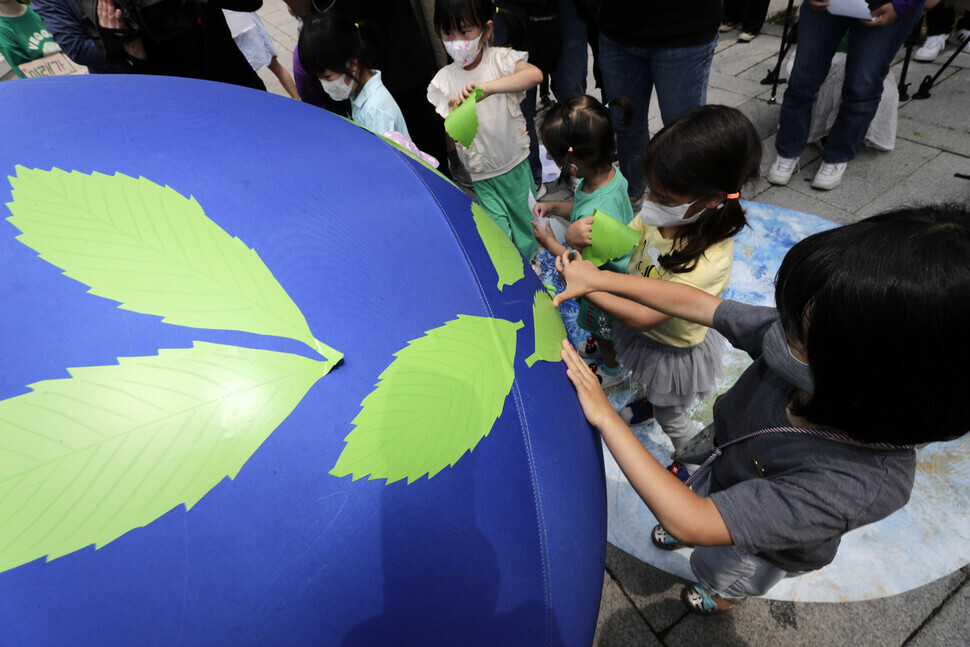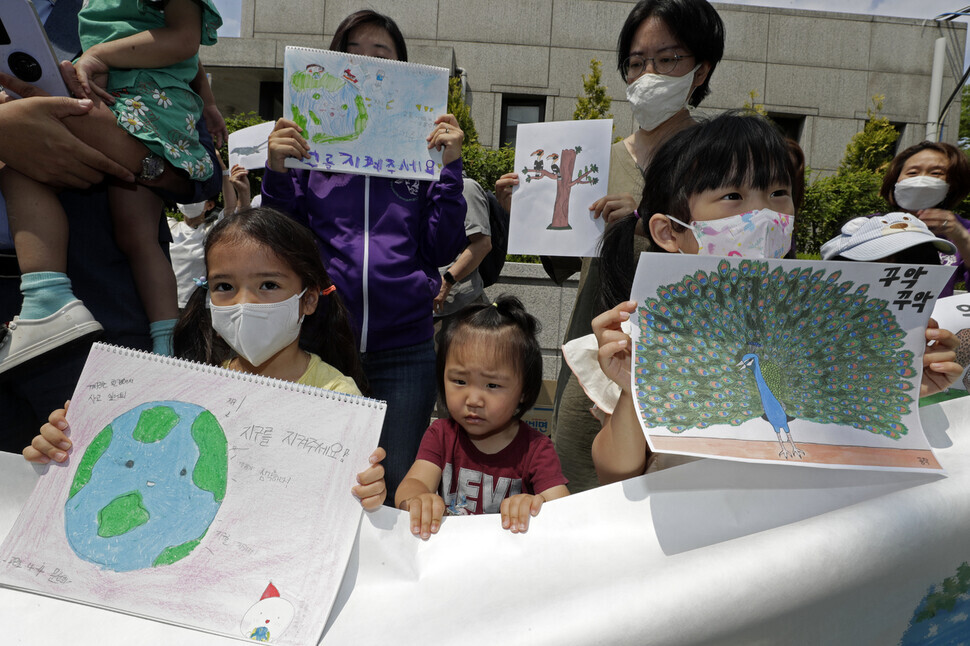hankyoreh
Links to other country sites 다른 나라 사이트 링크
S. Korean infants, children sue country to take bolder action on climate change

Eun-woo, who is just 22 months old, arrived at the press conference on a kick scooter. After hopping off his scooter, he held up a sign made from a cardboard box that read, “The Earth is ours.”
Eun-woo will most likely still be around in the year 2100. What will the planet look like then?
On Monday, a press conference for a constitutional complaint arguing that the enforcement decree for the Framework Act on Low Carbon, Green Growth violates the basic human rights of future generations took place outside of the Constitutional Court of Korea in Seoul’s Jongno District. Eun-woo is one of the 62 children filing the constitutional complaint, 40 of whom are 5 years old or younger and one of whom has yet to even be born.
The appeal is the first climate lawsuit in the world involving infants.
“The young generation of today cannot enjoy the luxury of carbon emission like previous generations. This is because emissions have already almost reached their permitted amount,” said Kim Yeong-hui, president of the anti-nuclear lawyers’ collective Sunflower, who is representing the children in the case, during the press conference.
The climate crisis is barreling toward a critical point, the inconvenience and dangers it poses to be shouldered by the future generation. If this situation goes unaddressed, would that not be a violation of rights stipulated in the Constitution?
Kim further said, “In this climate lawsuit, infants are directly filing the constitutional complaint in order to prove that South Korea’s nationally determined contribution (NDC) violates the rights and freedom of the young generation.”
Petitioners of the complaint believe that the enforcement decree of the Framework Act on Low Carbon, Green Growth is unconstitutional. Article 3, paragraph 1 of the decree sets South Korea’s NDC as a 40 percent reduction of emissions from 2018 levels by 2030, in accordance with the Paris Agreement. The petitioners argue that even if this goal is met, future generations’ right to the pursuit of happiness will still be infringed on.
According to the constitutional complaint, if the rise of the Earth’s temperature is capped to 1.5 degrees Celsius, an infant born in 2017 will be able to emit one-eighth of the carbon adults born in 1950 were able to emit. The younger generation will be forced to reduce their carbon emissions more stringently than the older generation. In other words, they will have to give up conveniences humans have enjoyed up until now.
The appeal’s youngest petitioner is “Woodpecker” (nickname), a 20-week-old fetus. The mother, 39-year-old Lee Dong-hyeon, held the microphone in one hand with her other hand on her stomach and said, “I can feel them moving right now. I can feel Woodpecker hiccup, which apparently is them practicing breathing by swallowing and spitting out amniotic fluid. My child has never taken a breath. They’ve never emitted even a single gram of carbon.”

Climate lawsuits are in progress in other countries as well. In South Korea, a total of four constitutional complaints including the recent one involving infants have been filed, the first of which was filed in March 2020 by Youth 4 Climate Action. All four complaints point out that the NDC set by the South Korean government is insufficient and violates the basic human rights of future generations.
The petitioners of Monday’s complaint explained that what makes their case distinct is the fact that it’s being directly filed by members of the young generation themselves, “the greatest victims of climate change.”
“Adults don’t pay attention to our future. That’s because in the future, when the climate crisis will have become serious, adults won’t be around anymore, but we will have to live painful lives,” said Han Je-ah, a fourth grader at Heukseok Elementary School.
Running through the issue of climate change are multiple layers of injustices. Just like inter-state injustice has allowed developed nations to neglect their responsibility to act on climate change after emitting enormous amounts of carbon thus far, intergenerational injustice has allowed the older generation to live as onlookers to today’s era of the climate crisis — or at least that’s how the petitioners feel.
What will make or break the appeal is whether the Constitutional Court will acknowledge the rights of future generations. In order for basic human rights violations to be recognized, the violation in question should be “direct” and “immediate.”
Meanwhile, court rulings recognizing the rights of adolescents and the young generation are emerging in Europe. In April last year, the German federal constitutional court concluded that Germany’s NDC according to its Climate Change Act is insufficient, ruling that it is unconstitutional to pass on the burden of carbon emission reduction to future generations.
By Nam Jong-young, staff reporter
Please direct questions or comments to [english@hani.co.kr]

Editorial・opinion
![[Editorial] Does Yoon think the Korean public is wrong? [Editorial] Does Yoon think the Korean public is wrong?](https://flexible.img.hani.co.kr/flexible/normal/500/300/imgdb/original/2024/0417/8517133419684774.jpg) [Editorial] Does Yoon think the Korean public is wrong?
[Editorial] Does Yoon think the Korean public is wrong?![[Editorial] As it bolsters its alliance with US, Japan must be accountable for past [Editorial] As it bolsters its alliance with US, Japan must be accountable for past](https://flexible.img.hani.co.kr/flexible/normal/500/300/imgdb/original/2024/0417/6817133413968321.jpg) [Editorial] As it bolsters its alliance with US, Japan must be accountable for past
[Editorial] As it bolsters its alliance with US, Japan must be accountable for past- [Guest essay] Amending the Constitution is Yoon’s key to leaving office in public’s good graces
- [Editorial] 10 years on, lessons of Sewol tragedy must never be forgotten
- [Column] A death blow to Korea’s prosecutor politics
- [Correspondent’s column] The US and the end of Japanese pacifism
- [Guest essay] How Korea turned its trainee doctors into monsters
- [Guest essay] As someone who helped forge Seoul-Moscow ties, their status today troubles me
- [Editorial] Koreans sent a loud and clear message to Yoon
- [Column] In Korea’s midterm elections, it’s time for accountability
Most viewed articles
- 1[Column] The clock is ticking for Korea’s first lady
- 2Samsung barricades office as unionized workers strike for better conditions
- 3[Editorial] When the choice is kids or career, Korea will never overcome birth rate woes
- 4[News analysis] After elections, prosecutorial reform will likely make legislative agenda
- 5S. Korea, Japan reaffirm commitment to strengthening trilateral ties with US
- 6Japan officially says compensation of Korean forced laborers isn’t its responsibility
- 7Why Israel isn’t hitting Iran with immediate retaliation
- 8[Editorial] Does Yoon think the Korean public is wrong?
- 9[Guest essay] How Korea turned its trainee doctors into monsters
- 10[Guest essay] Amending the Constitution is Yoon’s key to leaving office in public’s good graces